人教版(2019)选择性必修 第二册Unit 2 Bridging Cultures Learning about Language 课件(共34张PPT)
文档属性
| 名称 | 人教版(2019)选择性必修 第二册Unit 2 Bridging Cultures Learning about Language 课件(共34张PPT) |
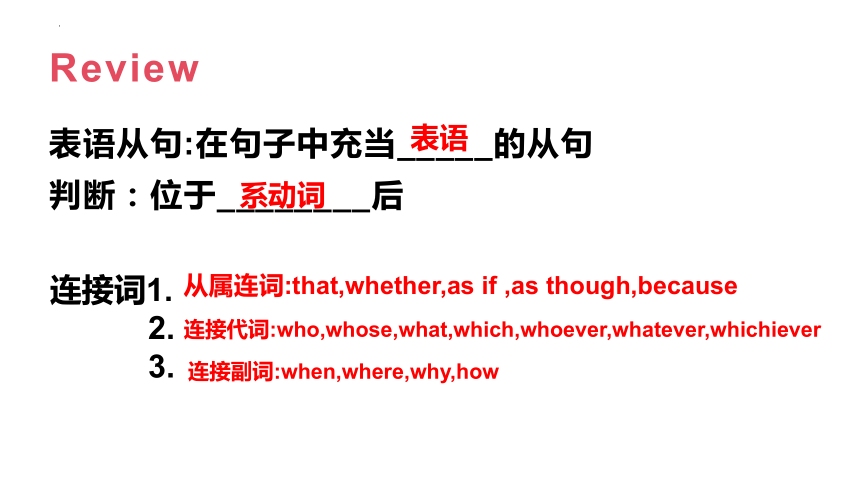
|
|
| 格式 | pptx | ||
| 文件大小 | 174.1KB | ||
| 资源类型 | 教案 | ||
| 版本资源 | 人教版(2019) | ||
| 科目 | 英语 | ||
| 更新时间 | 2023-09-14 00:00:00 | ||
图片预览

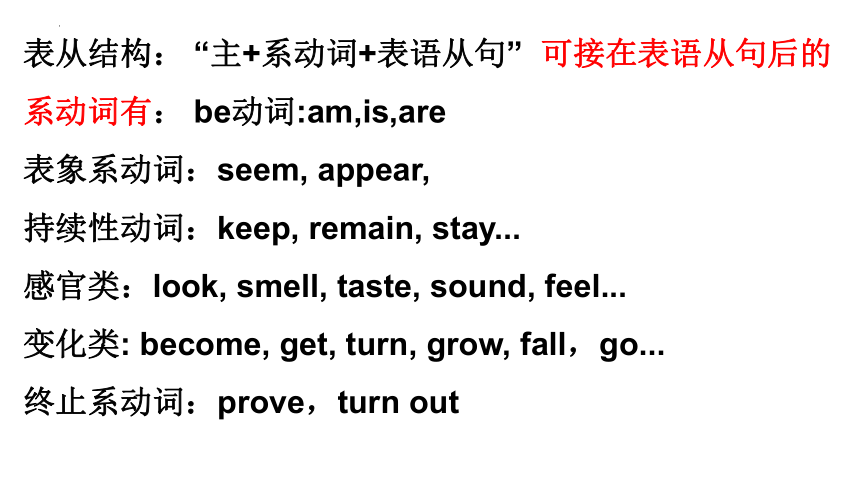

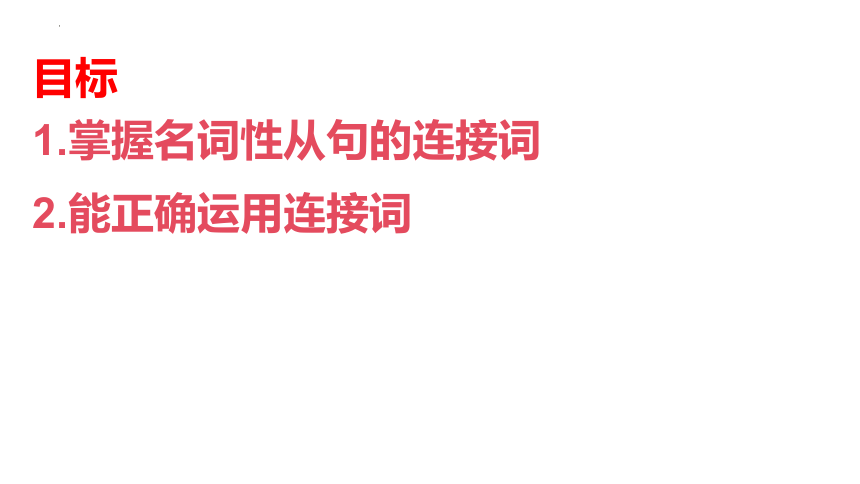
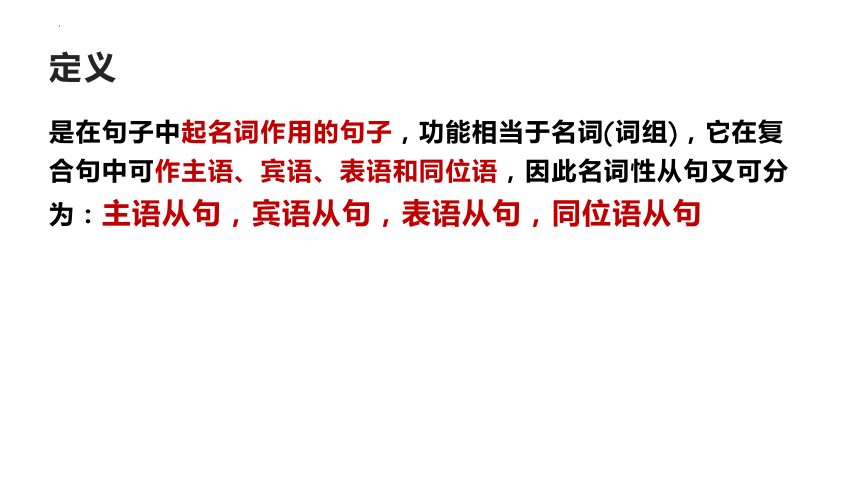
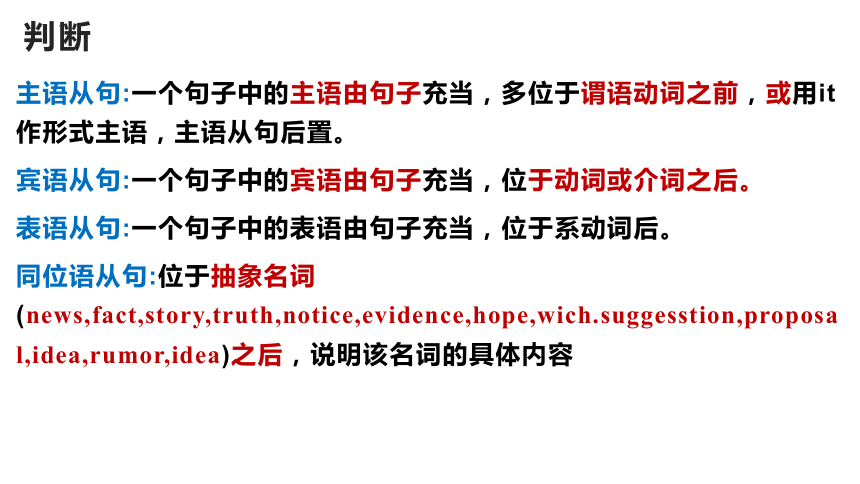
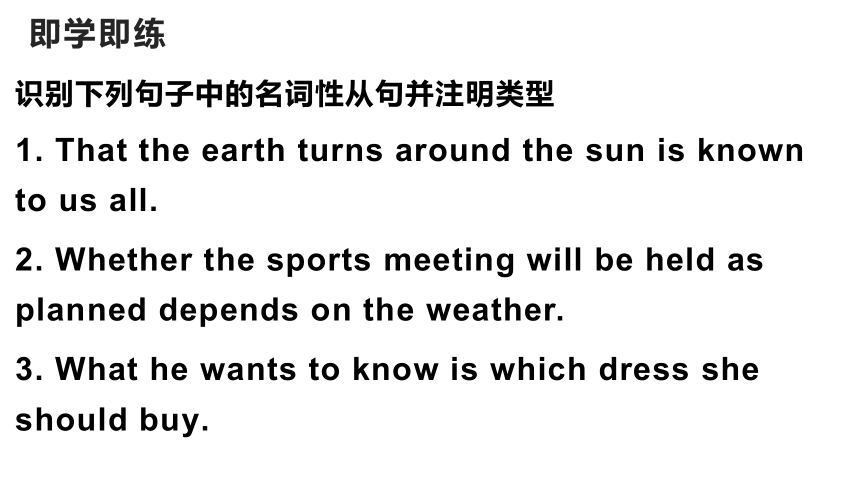
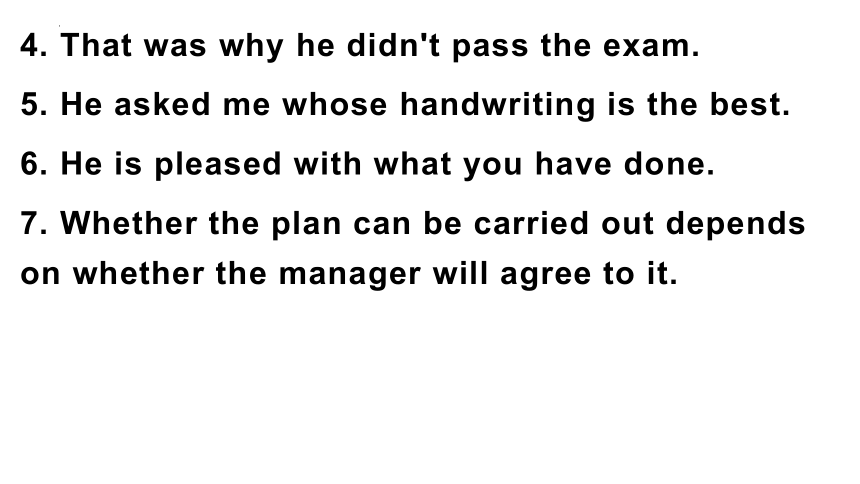
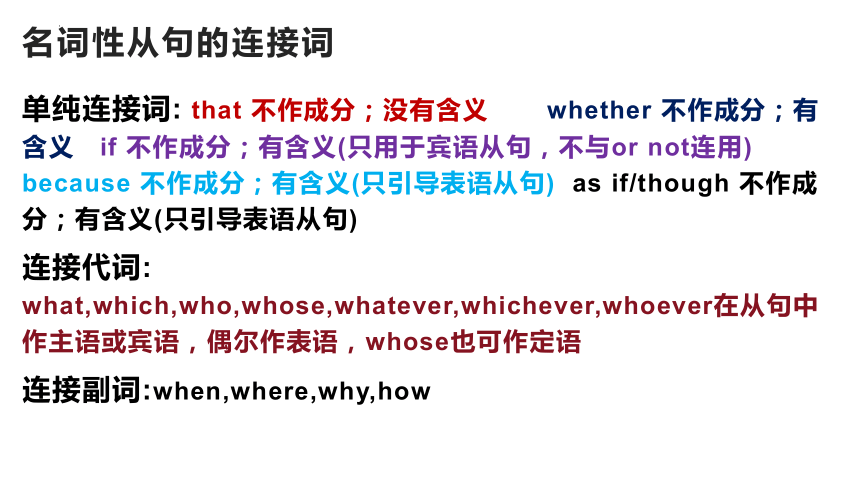
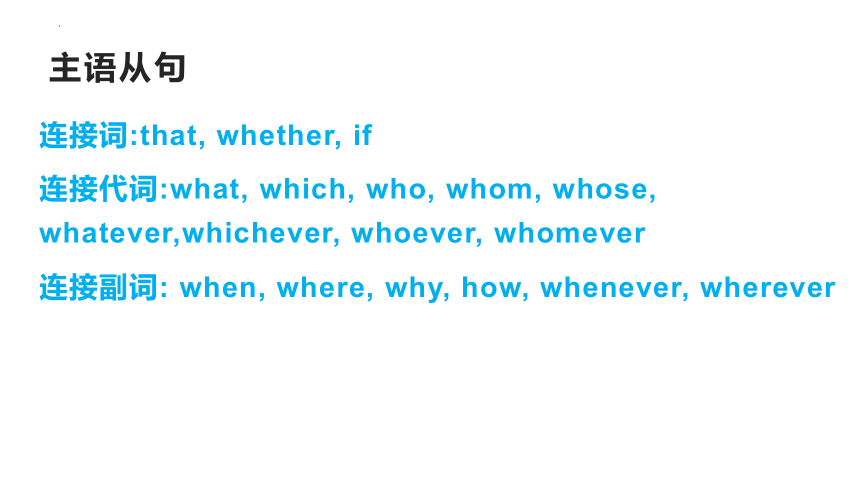
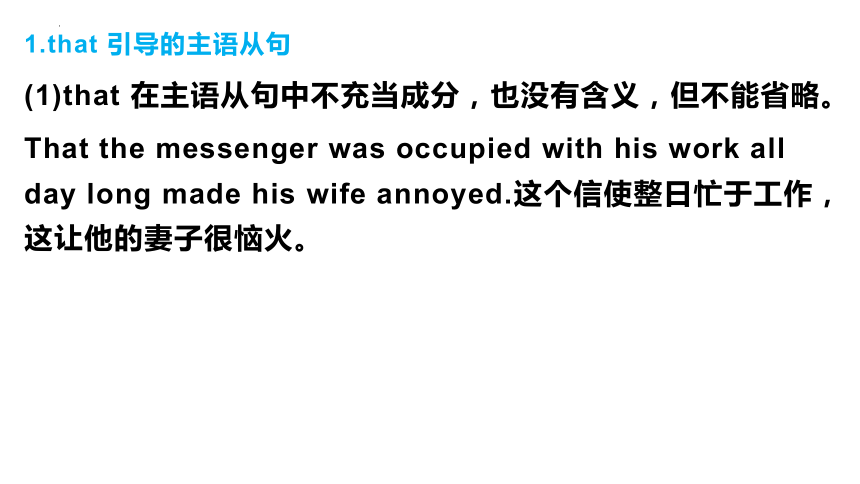
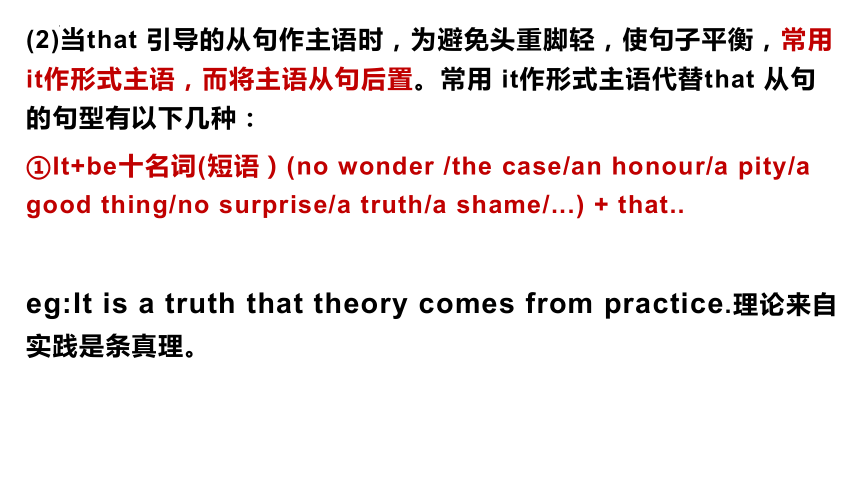
文档简介
(共34张PPT)
Review
表语从句:在句子中充当_____的从句
判断:位于________后
表语
系动词
连接词1.
2.
3.
从属连词:that,whether,as if ,as though,because
连接代词:who,whose,what,which,whoever,whatever,whichiever
连接副词:when,where,why,how
表从结构: “主+系动词+表语从句” 可接在表语从句后的系动词有: be动词:am,is,are
表象系动词:seem, appear,
持续性动词:keep, remain, stay...
感官类:look, smell, taste, sound, feel...
变化类: become, get, turn, grow, fall,go...
终止系动词:prove,turn out
名词性从句
目标
1.掌握名词性从句的连接词
2.能正确运用连接词
定义
是在句子中起名词作用的句子,功能相当于名词(词组),它在复合句中可作主语、宾语、表语和同位语,因此名词性从句又可分为:主语从句,宾语从句,表语从句,同位语从句
判断
主语从句:一个句子中的主语由句子充当,多位于谓语动词之前,或用it作形式主语,主语从句后置。
宾语从句:一个句子中的宾语由句子充当,位于动词或介词之后。
表语从句:一个句子中的表语由句子充当,位于系动词后。
同位语从句:位于抽象名词(news,fact,story,truth,notice,evidence,hope,wich.suggesstion,proposal,idea,rumor,idea)之后,说明该名词的具体内容
即学即练
识别下列句子中的名词性从句并注明类型
1. That the earth turns around the sun is known to us all.
2. Whether the sports meeting will be held as planned depends on the weather.
3. What he wants to know is which dress she should buy.
4. That was why he didn't pass the exam.
5. He asked me whose handwriting is the best.
6. He is pleased with what you have done.
7. Whether the plan can be carried out depends on whether the manager will agree to it.
名词性从句的连接词
单纯连接词: that 不作成分;没有含义 whether 不作成分;有含义 if 不作成分;有含义(只用于宾语从句,不与or not连用) because 不作成分;有含义(只引导表语从句) as if/though 不作成分;有含义(只引导表语从句)
连接代词: what,which,who,whose,whatever,whichever,whoever在从句中作主语或宾语,偶尔作表语,whose也可作定语
连接副词:when,where,why,how
主语从句
连接词:that, whether, if
连接代词:what, which, who, whom, whose, whatever,whichever, whoever, whomever
连接副词: when, where, why, how, whenever, wherever
1.that 引导的主语从句
(1)that 在主语从句中不充当成分,也没有含义,但不能省略。
That the messenger was occupied with his work all day long made his wife annoyed.这个信使整日忙于工作,这让他的妻子很恼火。
(2)当that 引导的从句作主语时,为避免头重脚轻,使句子平衡,常用it作形式主语,而将主语从句后置。常用 it作形式主语代替that 从句的句型有以下几种:
①It+be十名词(短语)(no wonder /the case/an honour/a pity/a good thing/no surprise/a truth/a shame/...) + that..
eg:It is a truth that theory comes from practice.理论来自实践是条真理。
②It +be+形容词(obvious/ true/natural/likely/possible/certain/...) + that...
eg:It is obvious that you've made a big mistake.显然,你犯了一个大错。
eg:It is certain that she will do very well in the exam.她一定会在这次考试中考得很好。
③It+be+过去分词(expected/believed/reported/thought/said/decided/...) +that..
eg:It's said that the couple have left the country.据说那对夫妇己经离开了这个国家。
④其他常见的用 It 作形式主语的句型:
It doesn't matter that.. ....是无关紧要的
It makes no difference that... ...没有影响
It occurred to/ struck/hit sb. that... 某人突然想到
eg:It doesn't matter that she doesn't agree with our plan.她不同意我们的计划没关系。
eg:It occurred to me that he might be the killer.我突然想到他可能是那个杀手。
2.whether/if 引导的主语从句
whether: 位于句首、句末 ,可以用it作形式主语,不作成分,只起连接作用
if:位于句末,必须用it作形式主语,不作,只起连接作用
只用whether而不用if的情况:
①主语从句在句首②从句后有“or not”③后接动词不定式
eg:Whether he witnessed the severe accident was not certain.= It was not certain whether/if he witnessed the severe accident.不确定他是否目睹了这起严重的事故。
Wether there is life on the moon is an interesting question.月球上有没有生命是个有趣的问题。
It doesn't matter whether you turn right or left at the crossing--both roads lead to the park.在十字路口向左还是向右并不重要——两条路都通向公园。
3.连接代词引导的主语从句
在从句中既起连接作用接作用,又在从句中充当主语、宾语或表语等成分。
What comes from the heart goes to the heart.[谚]肺腑之言感人心。
Which plan is better should be discussed.应该讨论哪一个计划更好。
4.连接副词引导的主语从句
在句中既起连接作用,又充当从句的时间、地点、原因或方式等状语。
When we'll set off for home hasn't been decided yet.我们何时动身回家还没决定。
Where she lives has not been found yet.还没有找到她住在哪里。
Why they got involved in the fight was still unknown.他们卷人这场打斗的原因仍然不明。
How this happened is not clear to anyone.这事是怎样发生的,谁也不清楚。
注意
1.从句的语序:在任何情况下,主语从句都用陈述语序。
2. 主谓一致:当单个从句作主语时,主向的谓语动词一般用单数形式;但当what 引导主语从句时,若主句的表语为复数形式,主句的谓语动词通常也用复数形式。
What they need is love.他们需要的是爱。
What they need are books.他们需要的是书。
宾语从句
连接词:that, whether, if
连接代词:what, which, who, whom, whose, whatever,whichever, whoever, whomever
连接副词: when, where, why, how,
1.that/if/whether引导的宾语从句
that 无意义,不作成分,可省略
whether 有意义,不作成分,不可省略,一般可与if互换
if 有意义,不作成分,不可省略,一般可与whether互换 ask,wonder,care,know,find out后
eg:We all agree that it will be very convenient to go there by train. 我们都认为乘火车去那里将会很方便。
Tom asked if/whether I had read the book.汤姆问我是否读过这本书。
当that 引导宾语从句时,that 通常可以省略,但在下列情况下 that 不能省略:
(1)当主句的谓语动词与宾语从句之间有插入语时,引导词that 通常不可省略。
Everyone could see, I believe, that Mike was very terrified. 我相信人人都能看出迈克很害怕。
(2)如果动词后面带有两个或两个以上并列的宾语从句,第一个宾语从句的引导词 that 可以省略,其余从句的引导词that 不能省略。
I believe (that) you have done your best and that everything will go well我相信你已经尽力了,而且一切都会顺利的。
在下列情况下用whether 而不用让引导宾语从句:
(1)当与or not 连用时,只能用 whether。
I don't know whether or not they could pass the exam.我不知道他们是否能通过考试。
(2)当从句位于介词之后时,只能用whether。
I am not interested in whether they believe in me or not.我对他们是否信任我不感兴趣。
2.连接代词引导的宾语从句
当连接代词引导宾语从句时,既起连接作用,又在从句中充当主语、宾语等成分
Do you ever discover who sent you the flowers?你弄清是谁给你送的花了吗?
3.连接副词引导的宾语从句
既起连接作用,又在从句中作时间、原因、地点或方式等状语。
He didn't tell me when we would meet again.他没有告诉我我们什么时候会再见面。
None of us knows where these new books can be bought.我们都不知道能在哪里买到这些新书。
4.(短语)动词后的宾语从句
大多数及物(短语)动词后都可以跟宾语从句,需要注意的是:
(1)在一些表示坚持(insist)、命令(order、command)、建议(suggest、recommend,advise)、要求 (request、require、demand,ask)、敦促(urge)等意义的动词后,that 引导的宾语从句要用虛拟语气,即从句谓语用“(should十)动词原形”。
She insisted that she (should) organize the trip perfectly.她坚持要把这次旅行安排得尽善尽美。
He commanded that all the gates (should) be shut.他命令关闲所有的大门。
I suggested that he (should) study harder. 我建议他更加努力学习。
(2)当动词 find,feel,consider , make,believe等后面有宾语补足语时,需要it作形式宾语,而将 that 引导的宾语从句后置。
We find it necessary that we practise spoken
English every day .我们发现每天练习英语口语是有必要的。
I have made it a rule that I keep a diaryevery day.我每天写日记已成了一个习惯。
(3)有些表示喜好、憎恶的动词后接从句作宾语时要用 it作形式宾语,常见的这类动词有hate、like 等。
I hate it when they talk with their mouths full.我讨厌他们满嘴食物时说话。
5.(短语)介词后的宾语从句
一般情况下,(短语)介词后常接 wh-类连接词引导的宾语从句。个别介词,如but、except、in 等后面接 that 引导的宾语从句己经成为习惯搭配,如 but that(若不是 )、except that(除了 )in that(因为...)。
I was curious as to what we would do next.
我很想知道下一步我们将做什么。
宾语从句的注意事项
1.语序:陈述句语序
2.时态:主过从必过,主现从不限,客观事实永为现
The teacher said that the earth runs around the sun.
The teacher told us that Tom had left us for America.
名词性从句解题步骤
1.判断从句类型(根据位置/看空格前后)
2.找出从句的起始位置
3.确定从句的谓语,然后看从句是否缺成分,缺什么成分。
4.结合句子意思
5.确定引导词
区别
1.The meeting that you have missed yesterday was very important.
2.The girl who is making a speech right now is our monitor.
Review
表语从句:在句子中充当_____的从句
判断:位于________后
表语
系动词
连接词1.
2.
3.
从属连词:that,whether,as if ,as though,because
连接代词:who,whose,what,which,whoever,whatever,whichiever
连接副词:when,where,why,how
表从结构: “主+系动词+表语从句” 可接在表语从句后的系动词有: be动词:am,is,are
表象系动词:seem, appear,
持续性动词:keep, remain, stay...
感官类:look, smell, taste, sound, feel...
变化类: become, get, turn, grow, fall,go...
终止系动词:prove,turn out
名词性从句
目标
1.掌握名词性从句的连接词
2.能正确运用连接词
定义
是在句子中起名词作用的句子,功能相当于名词(词组),它在复合句中可作主语、宾语、表语和同位语,因此名词性从句又可分为:主语从句,宾语从句,表语从句,同位语从句
判断
主语从句:一个句子中的主语由句子充当,多位于谓语动词之前,或用it作形式主语,主语从句后置。
宾语从句:一个句子中的宾语由句子充当,位于动词或介词之后。
表语从句:一个句子中的表语由句子充当,位于系动词后。
同位语从句:位于抽象名词(news,fact,story,truth,notice,evidence,hope,wich.suggesstion,proposal,idea,rumor,idea)之后,说明该名词的具体内容
即学即练
识别下列句子中的名词性从句并注明类型
1. That the earth turns around the sun is known to us all.
2. Whether the sports meeting will be held as planned depends on the weather.
3. What he wants to know is which dress she should buy.
4. That was why he didn't pass the exam.
5. He asked me whose handwriting is the best.
6. He is pleased with what you have done.
7. Whether the plan can be carried out depends on whether the manager will agree to it.
名词性从句的连接词
单纯连接词: that 不作成分;没有含义 whether 不作成分;有含义 if 不作成分;有含义(只用于宾语从句,不与or not连用) because 不作成分;有含义(只引导表语从句) as if/though 不作成分;有含义(只引导表语从句)
连接代词: what,which,who,whose,whatever,whichever,whoever在从句中作主语或宾语,偶尔作表语,whose也可作定语
连接副词:when,where,why,how
主语从句
连接词:that, whether, if
连接代词:what, which, who, whom, whose, whatever,whichever, whoever, whomever
连接副词: when, where, why, how, whenever, wherever
1.that 引导的主语从句
(1)that 在主语从句中不充当成分,也没有含义,但不能省略。
That the messenger was occupied with his work all day long made his wife annoyed.这个信使整日忙于工作,这让他的妻子很恼火。
(2)当that 引导的从句作主语时,为避免头重脚轻,使句子平衡,常用it作形式主语,而将主语从句后置。常用 it作形式主语代替that 从句的句型有以下几种:
①It+be十名词(短语)(no wonder /the case/an honour/a pity/a good thing/no surprise/a truth/a shame/...) + that..
eg:It is a truth that theory comes from practice.理论来自实践是条真理。
②It +be+形容词(obvious/ true/natural/likely/possible/certain/...) + that...
eg:It is obvious that you've made a big mistake.显然,你犯了一个大错。
eg:It is certain that she will do very well in the exam.她一定会在这次考试中考得很好。
③It+be+过去分词(expected/believed/reported/thought/said/decided/...) +that..
eg:It's said that the couple have left the country.据说那对夫妇己经离开了这个国家。
④其他常见的用 It 作形式主语的句型:
It doesn't matter that.. ....是无关紧要的
It makes no difference that... ...没有影响
It occurred to/ struck/hit sb. that... 某人突然想到
eg:It doesn't matter that she doesn't agree with our plan.她不同意我们的计划没关系。
eg:It occurred to me that he might be the killer.我突然想到他可能是那个杀手。
2.whether/if 引导的主语从句
whether: 位于句首、句末 ,可以用it作形式主语,不作成分,只起连接作用
if:位于句末,必须用it作形式主语,不作,只起连接作用
只用whether而不用if的情况:
①主语从句在句首②从句后有“or not”③后接动词不定式
eg:Whether he witnessed the severe accident was not certain.= It was not certain whether/if he witnessed the severe accident.不确定他是否目睹了这起严重的事故。
Wether there is life on the moon is an interesting question.月球上有没有生命是个有趣的问题。
It doesn't matter whether you turn right or left at the crossing--both roads lead to the park.在十字路口向左还是向右并不重要——两条路都通向公园。
3.连接代词引导的主语从句
在从句中既起连接作用接作用,又在从句中充当主语、宾语或表语等成分。
What comes from the heart goes to the heart.[谚]肺腑之言感人心。
Which plan is better should be discussed.应该讨论哪一个计划更好。
4.连接副词引导的主语从句
在句中既起连接作用,又充当从句的时间、地点、原因或方式等状语。
When we'll set off for home hasn't been decided yet.我们何时动身回家还没决定。
Where she lives has not been found yet.还没有找到她住在哪里。
Why they got involved in the fight was still unknown.他们卷人这场打斗的原因仍然不明。
How this happened is not clear to anyone.这事是怎样发生的,谁也不清楚。
注意
1.从句的语序:在任何情况下,主语从句都用陈述语序。
2. 主谓一致:当单个从句作主语时,主向的谓语动词一般用单数形式;但当what 引导主语从句时,若主句的表语为复数形式,主句的谓语动词通常也用复数形式。
What they need is love.他们需要的是爱。
What they need are books.他们需要的是书。
宾语从句
连接词:that, whether, if
连接代词:what, which, who, whom, whose, whatever,whichever, whoever, whomever
连接副词: when, where, why, how,
1.that/if/whether引导的宾语从句
that 无意义,不作成分,可省略
whether 有意义,不作成分,不可省略,一般可与if互换
if 有意义,不作成分,不可省略,一般可与whether互换 ask,wonder,care,know,find out后
eg:We all agree that it will be very convenient to go there by train. 我们都认为乘火车去那里将会很方便。
Tom asked if/whether I had read the book.汤姆问我是否读过这本书。
当that 引导宾语从句时,that 通常可以省略,但在下列情况下 that 不能省略:
(1)当主句的谓语动词与宾语从句之间有插入语时,引导词that 通常不可省略。
Everyone could see, I believe, that Mike was very terrified. 我相信人人都能看出迈克很害怕。
(2)如果动词后面带有两个或两个以上并列的宾语从句,第一个宾语从句的引导词 that 可以省略,其余从句的引导词that 不能省略。
I believe (that) you have done your best and that everything will go well我相信你已经尽力了,而且一切都会顺利的。
在下列情况下用whether 而不用让引导宾语从句:
(1)当与or not 连用时,只能用 whether。
I don't know whether or not they could pass the exam.我不知道他们是否能通过考试。
(2)当从句位于介词之后时,只能用whether。
I am not interested in whether they believe in me or not.我对他们是否信任我不感兴趣。
2.连接代词引导的宾语从句
当连接代词引导宾语从句时,既起连接作用,又在从句中充当主语、宾语等成分
Do you ever discover who sent you the flowers?你弄清是谁给你送的花了吗?
3.连接副词引导的宾语从句
既起连接作用,又在从句中作时间、原因、地点或方式等状语。
He didn't tell me when we would meet again.他没有告诉我我们什么时候会再见面。
None of us knows where these new books can be bought.我们都不知道能在哪里买到这些新书。
4.(短语)动词后的宾语从句
大多数及物(短语)动词后都可以跟宾语从句,需要注意的是:
(1)在一些表示坚持(insist)、命令(order、command)、建议(suggest、recommend,advise)、要求 (request、require、demand,ask)、敦促(urge)等意义的动词后,that 引导的宾语从句要用虛拟语气,即从句谓语用“(should十)动词原形”。
She insisted that she (should) organize the trip perfectly.她坚持要把这次旅行安排得尽善尽美。
He commanded that all the gates (should) be shut.他命令关闲所有的大门。
I suggested that he (should) study harder. 我建议他更加努力学习。
(2)当动词 find,feel,consider , make,believe等后面有宾语补足语时,需要it作形式宾语,而将 that 引导的宾语从句后置。
We find it necessary that we practise spoken
English every day .我们发现每天练习英语口语是有必要的。
I have made it a rule that I keep a diaryevery day.我每天写日记已成了一个习惯。
(3)有些表示喜好、憎恶的动词后接从句作宾语时要用 it作形式宾语,常见的这类动词有hate、like 等。
I hate it when they talk with their mouths full.我讨厌他们满嘴食物时说话。
5.(短语)介词后的宾语从句
一般情况下,(短语)介词后常接 wh-类连接词引导的宾语从句。个别介词,如but、except、in 等后面接 that 引导的宾语从句己经成为习惯搭配,如 but that(若不是 )、except that(除了 )in that(因为...)。
I was curious as to what we would do next.
我很想知道下一步我们将做什么。
宾语从句的注意事项
1.语序:陈述句语序
2.时态:主过从必过,主现从不限,客观事实永为现
The teacher said that the earth runs around the sun.
The teacher told us that Tom had left us for America.
名词性从句解题步骤
1.判断从句类型(根据位置/看空格前后)
2.找出从句的起始位置
3.确定从句的谓语,然后看从句是否缺成分,缺什么成分。
4.结合句子意思
5.确定引导词
区别
1.The meeting that you have missed yesterday was very important.
2.The girl who is making a speech right now is our monitor.
